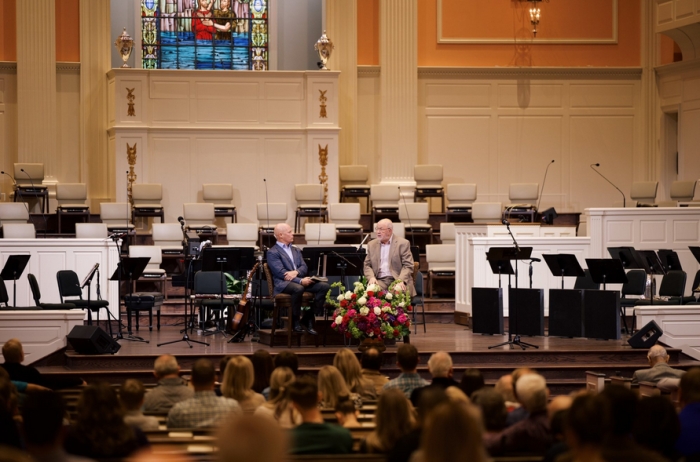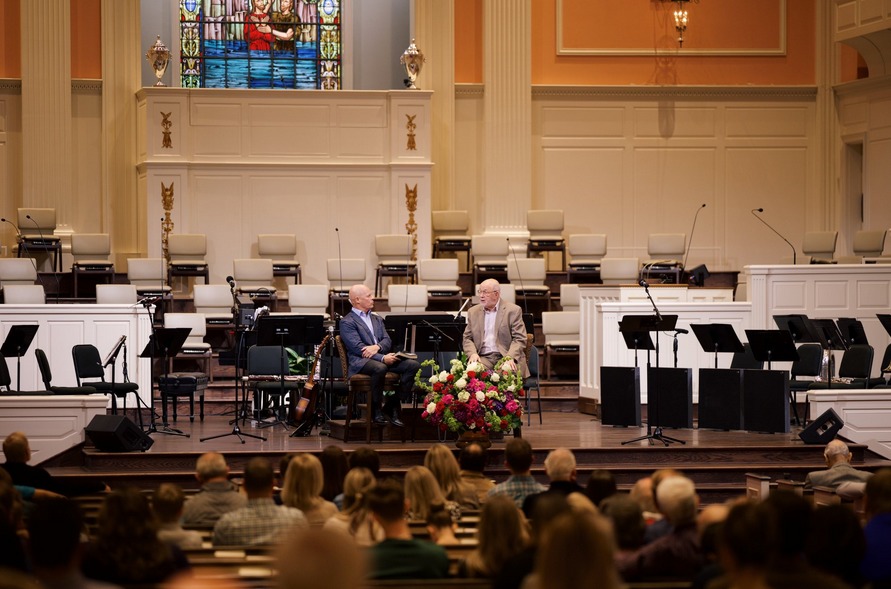
DALLAS — Is one of the most oft-cited Bible verses used to support the atonement actually about the Apostle Paul?
At the conclusion of “Exploring Philippians with N.T. Wright,” a three-day conference at Park Cities Baptist Church, the renowned New Testament scholar took direct aim at foundational tenets of Reformed theology during a Q&A session near the close of the conference. Drawing from his 2013 book Paul and the Faithfulness of God, Wright, 76, reframed 2 Corinthians 5:21 not as a cornerstone of penal substitutionary atonement, but as a profound defense of Paul’s apostolic ministry amid fierce opposition.
For generations, Reformed theologians have largely viewed the verse — "God made him who had no sin to be sin for us, so that in him we might become the righteousness of God in him” — as the biblical linchpin for imputed righteousness, a longstanding Protestant teaching that Christ's perfect obedience and sinlessness is credited to those who have put their trust in Him, justifying them before God.
But Wright dismissed such readings as a "straggler" interpretation, severed from its narrative context. "The whole passage is about Paul’s apostolic ministry and the defense of the apostolic ministry over and against the Corinthian attack that he’s not really a proper apostle," Wright said. He pointed to what he sees as Paul's triple refrain in the chapter, that “God was in Christ reconciling the world to himself and entrusting us with the message of reconciliation.”
"That isn’t about atonement," Wright said. "That’s about the ministry."
The crux of Wright's critique hinged on the verb "become" — a Greek word used by Paul that, he said, would likely have been different had he intended to communicate the idea of imputed righteousness. "If it was imputed righteousness, he wouldn’t have said 'become,'" Wright argued. Instead, he proposed "righteousness" here evokes God's “covenant faithfulness” — a recurring Pauline motif, said Wright, where divine promises to Israel find fulfillment in Christ and are embodied in the apostle's life.
Paul, Wright contended, positions himself as a living icon of this faithfulness, vindicated by the cross to serve as its herald.
To bolster his case, Wright highlighted Paul's invocation of Isaiah 49, the Servant Song of the Old Testament, where the Messiah becomes "a covenant for the people, a light for the Gentiles."
"Paul is saying because of the death of Jesus, that has constituted me, as an embodiment of God’s covenant faithfulness," Wright explained. "The 'become' is crucial there. The Isaiah 49 reference is crucial." This, he said, propels straight into 2 Corinthians 6's portrait of resilient ministry, underscoring Paul's embattled apostleship against Corinthian elitism.
Luther and other Reformed theologians have referred to 2 Corinthians 5:21 — long considered a proof text for the imputed righteousness of Christ — as the “wonderful exchange,” while contemporary Evangelical pastors like John Piper have suggested the passage describes a “double imputation” of God’s righteousness to the believer by faith, while his sins were imputed to Christ on the cross.
In the past, Wright has offered various interpretations of the atonement, writing in his 2016 book The Day the Revolution Began, “It is easy to imagine that it carries a single and obvious meaning. It does not.”
According to a 2009 Southern Baptist Theological Seminary review, Wright distinguishes between righteousness as a legal verdict — known as justification — and a transfer of a legal status or substance. He sees justification as God's declaration that a sinner is declared “not guilty” because of Christ's sacrifice, rather than God giving the believer Christ's own perfect righteousness.
This view, which Reformed publication Ligonier once called “wrong and confusing,” has also faced criticism from the likes of the late Grace Community Church Pastor John MacArthur, who, in 2017, referred to Wright as a “happy heretic” and criticized The Day the Revolution Began as little more than “piled up high-sounding words, raised up against the knowledge of God, to be smashed by the truth: fortifications to be crushed under the force of the truth.”
News Source : https://www.christianpost.com/news/theologian-nt-wright-2-corinthians-5-isnt-about-atonement.html
 Your post is being uploaded. Please don't close or refresh the page.
Your post is being uploaded. Please don't close or refresh the page.





